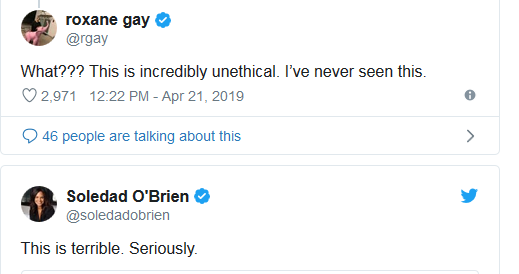You have /5 articles left.
Sign up for a free account or log in.
Social media is full of reports on higher education -- some true and many false. We typically ignore claims that can't be verified, but sometimes a tweet attracts so much attention -- from reputable news organizations and journalists -- that there may be value in saying that there's no proof behind the claim.
In this case, an accusation that a professor was charging students for letters of recommendation attracted coverage from the U.S. and Australia and outrage from prominent social commentators and journalists.

It's of course difficult to demonstrate that something didn't happen. But there is no evidence to back the claim in the original tweet, which was retweeted by more than 1,000 people on Twitter and liked by more than 6,000 people.
Many of the hundreds of comments in reply said that they shared the anger of the student, and they were quick to condemn the professor (listed only by last name). The issue of a professor assigning his or her own textbooks is one that comes up periodically. Many colleges frown upon it or bar professors from receiving profits from such assignments, but others don't intervene. This is a documented, real issue.
The issue of charging for letters of recommendation, however, appears to be a new one. Most of those commenting said they were stunned by such an action. Many urged the person on Twitter to go public with the professor's name. Some of those commenting did suggest that the story might not be true.
Then Syed (the name by which the alleged professor addressed the student) posted again, saying that he appreciated the support, but that he wasn't going to reveal the identity of the professor. He said he didn't want a "public execution" of the professor, but that he would report the professor (presumably to his college).
While some applauded the decision to report the professor, some said that the failure to name the professor suggested that the incident was a hoax.
Inside Higher Ed reached out to the person via Twitter and did not receive an answer to our questions.
Some on Twitter speculated that the student and professors were at a certain university. Inside Higher Ed contacted the university, which said that it had no student matching the name and no professor with the last name used in the note.
At the American Association of University Professors, officials said that they had not heard of the practice. The AAUP has argued that faculty members have the right to write a recommendation or not, based on their view of the student involved, but prior discussions haven't covered issues of fees.
Hank Reichman, professor emeritus of history at California State University, East Bay, and chair of Committee A on Academic Freedom and Tenure of the AAUP, said of the accusation in the tweet, "If it's real, it's arguably a violation of the [association's] Statement on Professional Ethics."
Specifically, he pointed to this provision: "As teachers, professors encourage the free pursuit of learning in their students. They hold before them the best scholarly and ethical standards of their discipline. Professors demonstrate respect for students as individuals and adhere to their proper roles as intellectual guides and counselors. Professors make every reasonable effort to foster honest academic conduct and to ensure that their evaluations of students reflect each student’s true merit. They respect the confidential nature of the relationship between professor and student. They avoid any exploitation, harassment or discriminatory treatment of students. They acknowledge significant academic or scholarly assistance from them. They protect their academic freedom."




